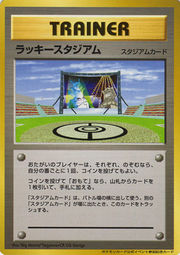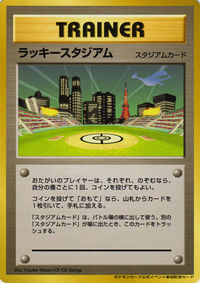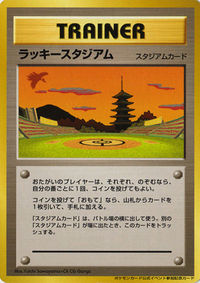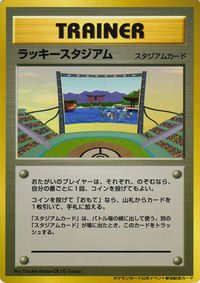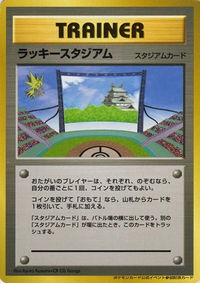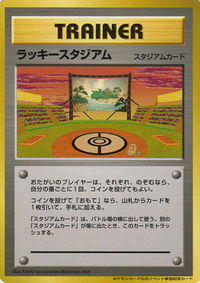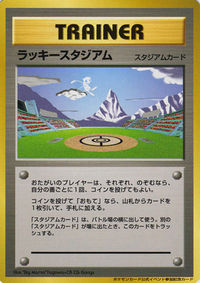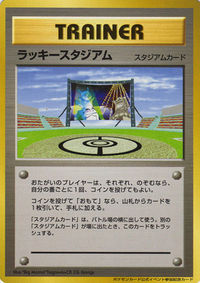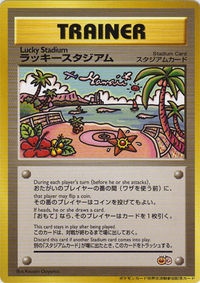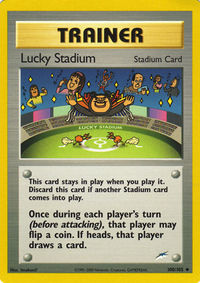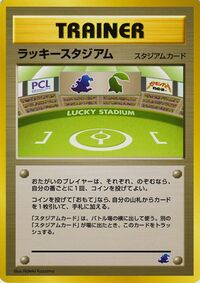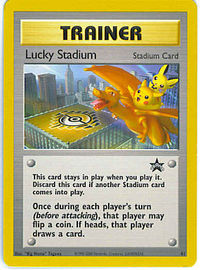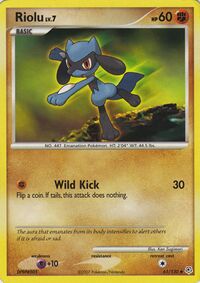From Bulbapedia, the community-driven Pokémon encyclopedia.
|
|
Lucky Stadium
ラッキースタジアム Lucky Stadium
|
|
| Japanese expansion
|
Intro Pack Neo
|
| Japanese Side Deck
|
Totodile Side Deck
|
|
|
|
|
|
|
|
Lucky Stadium (Japanese: ラッキースタジアム Lucky Stadium) is a Stadium card. It was first released as part of the Neo Destiny expansion.
Card text
| Tropical Mega Battle print
|
|

|
You can't have more than 1 ACE SPEC card in your deck.
|
|

|
You can't have more than 1 ACE SPEC card in your deck.
|
|
|
|
|
|

|
You can't have more than 1 ACE SPEC card in your deck.
|
|
|
|
 FLARE FLARE
|
|
|
 (Prism Star) Rule (Prism Star) Rule
You can't have more than 1  card with the same name in your deck. If a card with the same name in your deck. If a  card would go to the discard pile, put it in the Lost Zone instead. card would go to the discard pile, put it in the Lost Zone instead.
|
|
|
|
|
|
|
|
|
|
|
|
|
|
|
|
|
|
| During each player's turn (before he or she attacks), that player may flip a coin. If heads, he or she draws a card.
|
|
|
|
Do Nothing
|
|
| At the beginning of your turn, flip a coin. If heads, you can do nothing during your turn. If tails, your opponent can do nothing during his or her next turn.
|
|
|
|
|
|
| At the beginning of your turn, flip a coin. If heads, you can do nothing during your turn. If tails, your opponent can do nothing during his or her next turn.
|
|
|
|
Do Nothing
|
|
| At the beginning of your turn, flip a coin. If heads, you can do nothing during your turn. If tails, your opponent can do nothing during his or her next turn.
|
|
| This card stays in play after being played. Discard this card if another Stadium card comes into play.
|
|
|
|

|
You can't have more than 1 ACE SPEC card in your deck.
|
|

|
You can't have more than 1 ACE SPEC card in your deck.
|
|
|
|
|
|

|
You can't have more than 1 ACE SPEC card in your deck.
|
|
|
|
 FLARE FLARE
|
|
|
 (Prism Star) Rule (Prism Star) Rule
You can't have more than 1  card with the same name in your deck. If a card with the same name in your deck. If a  card would go to the discard pile, put it in the Lost Zone instead. card would go to the discard pile, put it in the Lost Zone instead.
|
|
|
|
|
|
|
|
|
|
|
|
|
|
| This card stays in play when you play it. Discard this card if another Stadium card comes into play.
|
|
|
|
| Once during each player's turn (before attacking), that player may flip a coin. If heads, that player draws a card.
|
|
|
|
Do Nothing
|
|
| At the beginning of your turn, flip a coin. If heads, you can do nothing during your turn. If tails, your opponent can do nothing during his or her next turn.
|
|
|
|
|
|
| At the beginning of your turn, flip a coin. If heads, you can do nothing during your turn. If tails, your opponent can do nothing during his or her next turn.
|
|
|
|
Do Nothing
|
|
| At the beginning of your turn, flip a coin. If heads, you can do nothing during your turn. If tails, your opponent can do nothing during his or her next turn.
|
|
|
|
Release information
This card was first awarded to participants of the Japanese World Challenge Summer tournaments held between July and August 2000. There were eight variations of the card printed, each one exclusive to a region of Japan in which the tournaments were held. Details of their release are as follows:
- Kantō print (features Lugia) was available at Pacifico Yokohama, Yokohama between July 1–2, 2000.
- Kansai print (features Ho-Oh) was available at the Asia & Pacific Trade Center (ATC), Osaka between July 8–9, 2000.
- Hokkaidō print (features Pikachu) was available at the Tsukisamu Green Dome, Sapporo on July 16, 2000.
- Chūbu print (features Zapdos) was available at the Nagoya Trade & Industry Center, Nagoya on July 22, 2000.
- Hokushin'etsu print (features Mew) was available at the Niigata City Industrial Promotion Center, Niigata on July 26, 2000.
- Kyūshū print (features Onix) was available at the West Japan General Exhibition Center, Fukuoka on July 30, 2000.
- Chūgoku/Shikoku print (features Gyarados) was available at the Hiroshima Sun Plaza, Hiroshima on August 2, 2000.
- Tōhoku print (features Diglett) was available at Sendai Wasse, Sendai on August 6, 2000.
Competitors who earned a place at the Tropical Mega Battle Tournament, held at the Hilton Hawaiian Village, Honolulu between August 26–27, 2000 were awarded a bilingual print with new artwork by Kouichi Ooyama.
The card was first printed in English in the Neo Destiny expansion with new artwork by Imakuni?. It was reprinted again in Japan in the Intro Pack Neo, which was released in April 2001 and illustrated by Hideki Kazama. The lone promotional print outside Japan was released at the opening of Pokémon Center New York, illustrated by "Big Mama" Tagawa. This print remains English-exclusive.
Gallery
Trivia
- All of the cards feature a stylized stadium, often related to the area in which the print was available, with at least one Pokémon in the image. The only variants which do not conform to this are the Neo Destiny print, which features Imakuni? himself and people dancing; and the Intro Pack Neo print, which features the symbols of the two Half Decks, as well as adverts for the Neo series and Pokémon Card Laboratory.
- The prints awarded during the World Challenge Summer campaign all feature regional landmarks:
- The Kyūshū print features Mount Aso, Japan's largest active volcano.
- The Kantō print features several high-rise buildings of the Tokyo cityscape, and the Tokyo Radio Tower.
- The Kansai print features the pagoda at Tō-ji, Kyoto, Japan's tallest pagoda.
- The Chūgoku/Shikoku print features the 'floating' torii at Itsukushima Shrine, Hatsukaichi.
- The Chūbu print features the central tower of Osaka Castle.
- The Tōhoku print features the Godaido Shrine among the islands of Matsushima.
- The Hokushin'etsu print features several mountains of the Japanese Alps.
- The Hokkaidō print features a sculpture of Pikachu in front of the Sapporo Clock Tower in celebration of the Sapporo Snow Festival.
- The Tropical Mega Battle print is extremely rare with less than 50 copies printed based on the number of competitors at the tournament.
- Variational prints based on the region tournaments were held in would later be replicated with the Pokémon Pal City promotional card, also a Stadium card.
- This card's effect matches that of Battle City, a card later released as one of the BW Black Star Promos.
- In the background of the New York City print, the Empire State Building can be seen.
Origin

